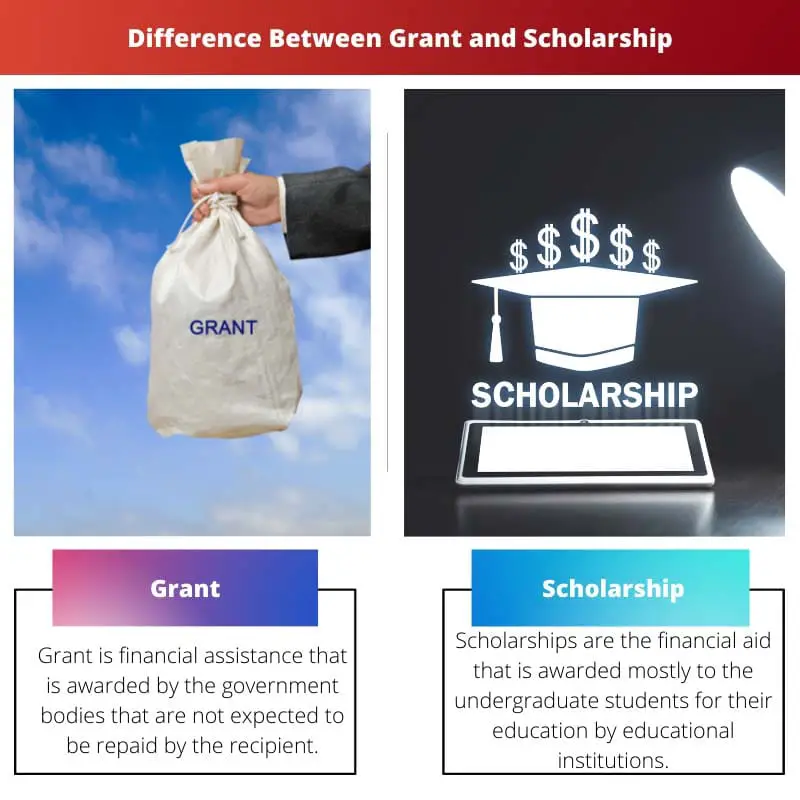A grant is need-based financial aid that does not require repayment, while a scholarship is merit-based financial assistance awarded for academic, athletic, or other achievements. Grants are need-dependent, while scholarships are awarded based on academic excellence or specific criteria set by the provider. Both provide funding for education but differ in their eligibility criteria and the basis for awarding them.
Key Takeaways
- Grants are financial awards provided to individuals or organizations, primarily based on financial need, to fund a specific purpose, project, or research.
- Scholarships are merit-based financial awards given to students to support their education, determined by factors like academic achievements, extracurricular involvement, or leadership qualities.
- The main distinction between grants and scholarships is their basis for awarding funds, with grants primarily focusing on financial needs and specific purposes. In contrast, scholarships are merit-based and geared towards supporting education.
Grant vs Scholarship
The difference between grants and Scholarships is their meanings. The fund offering for emergencies such as the financial need for further study, career, or development is a grant. Conversely, a scholarship is receivable by one based on particular potential, skill, or grades. Both are non-repayable funds, but their purposes vary. A scholarship can be called a reward that a student earns. And Grants can help NGOs or businesses.

Comparison Table
| Feature | Grant | Scholarship |
|---|---|---|
| Primary Basis | Financial Need | Merit (academic achievement, skills, talent) |
| Source of Funding | Government agencies, non-profit organizations, private foundations | Universities, government agencies, private organizations, individuals |
| Repayment | Generally not required | Generally not required |
| Restrictions | Often restricted to specific groups, fields of study, or activities | Can be general or specific to certain fields, demographics, or activities |
| Selection Process | Typically based on financial need assessment and application essays | Typically based on academic record, awards, achievements, and essays |
| Amount Awarded | Varies widely, can be full or partial tuition | Varies widely, can be full or partial tuition, or specific amounts for books, housing, etc. |
| Additional Requirements | Some grants may have additional requirements like maintaining a certain GPA or participating in specific programs | Some scholarships may have additional requirements like maintaining a certain GPA, participating in specific activities, or providing service hours |
| Focus | Often aimed at increasing access to education for underserved populations | Recognizing and rewarding academic excellence, talent, or specific skills |
| Competition | Often highly competitive due to limited funding | Can be highly competitive depending on the scholarship and number of applicants |
| Overall Purpose | Provide financial assistance to students who demonstrate financial need | Acknowledge and reward outstanding students in various fields |
What is Grant?
A grant is a financial aid provided by a government body, organization, or institution to individuals, businesses, or projects for a specific purpose. Grants are awarded based on demonstrated need, specific projects, or initiatives that align with the goals and priorities of the grantor. Unlike loans, grants do not require repayment, making them a form of gift aid.
Characteristics of Grants
- Need-Based: Grants are awarded to individuals or entities with financial need. The grantor assesses the financial situation of the applicant to determine eligibility.
- Project-Specific: Grants may be designated for particular projects, such as research, community development, or educational programs. Applicants must align their proposals with the grant’s objectives.
- Varied Funding Sources: Grants can come from various sources, including government agencies, non-profit organizations, foundations, and private institutions.
- Application Process: Applicants need to submit a detailed proposal outlining their intentions, goals, and budgetary requirements. The selection process is competitive, with the grantor assessing the feasibility and impact of the proposed project.
- Non-Repayable: One of the key features of grants is that they do not require repayment. Once awarded, the funds are considered a gift to support the specified purpose.
- Reporting Requirements: Recipients of grants are required to provide periodic reports detailing the progress of the funded project. This ensures accountability and transparency in the use of grant funds.
Types of Grants
- Government Grants: Provided by governmental bodies at the federal, state, or local levels to support various initiatives, including education, research, and community development.
- Foundation Grants: Offered by private foundations that allocate funds to support specific causes, such as healthcare, environmental conservation, or social justice.
- Corporate Grants: Companies may provide grants to support projects or programs that align with their corporate social responsibility objectives.
- Educational Grants: Aimed at supporting students’ education, covering tuition, fees, or other educational expenses.

What is Scholarship?
A scholarship is a form of financial aid provided to students to support their education, and it is awarded based on merit, achievement, or certain criteria set by the scholarship provider.
Types of Scholarships
- Merit-Based Scholarships: Awarded to students with outstanding academic, athletic, artistic, or extracurricular achievements.
- Need-Based Scholarships: Granted to students based on financial need, determined by family income and other financial circumstances.
- Specific Criteria Scholarships: Given to individuals who meet specific eligibility criteria, such as belonging to a particular demographic group, pursuing a specific field of study, or demonstrating unique talents.
Sources of Scholarships
- Institutional Scholarships: Offered by colleges and universities to attract and support high-achieving students.
- Private Scholarships: Provided by organizations, foundations, or companies with a vested interest in supporting education and specific fields.
- Government Scholarships: Offered by government entities to promote education and specific areas of study.
Application Process
- Research: Identify and research scholarships that align with your academic, personal, or career goals.
- Application Submission: Prepare and submit a scholarship application, including required documents such as transcripts, recommendation letters, and essays.
- Selection Process: Scholarship committees review applications, considering the established criteria, and select recipients based on merit, need, or other specified factors.
Benefits of Scholarships
- Financial Support: Scholarships provide financial assistance to cover tuition, fees, and other educational expenses, reducing the financial burden on students.
- Recognition: Merit-based scholarships acknowledge and reward students for their exceptional achievements and contributions.
- Opportunities: Scholarships can open doors to educational opportunities that might otherwise be financially inaccessible, allowing students to pursue their academic and career aspirations.

Main Differences Between Grant and Scholarship
- Basis for Award:
- Grant: Typically need-based financial aid.
- Scholarship: Primarily merit-based, awarded for academic, athletic, or specific achievements.
- Repayment:
- Grant: Usually does not require repayment.
- Scholarship: Generally does not require repayment, but some may have specific conditions or obligations.
- Eligibility Criteria:
- Grant: Often dependent on financial need.
- Scholarship: Based on academic excellence, talents, or meeting specific criteria set by the provider.
- Purpose:
- Grant: Aims to provide financial assistance to those with demonstrated need.
- Scholarship: Rewards and supports individuals for their achievements, encouraging excellence in academics, sports, or other areas.
- Sources:
- Grant: Can be provided by government agencies, institutions, or private organizations to address financial gaps.
- Scholarship: Offered by various entities, including institutions, private organizations, and government bodies, to recognize and support talent and achievement.
- Application Process:
- Grant: Often involves demonstrating financial need through documentation.
- Scholarship: Requires submitting applications, essays, recommendation letters, and other materials showcasing academic or other achievements.
- Types:
- Grant: Various types, including federal, state, and institutional grants.
- Scholarship: Merit-based, need-based, and specific-criteria scholarships.
- Financial Focus:
- Grant: Primarily addresses financial need.
- Scholarship: Emphasizes recognizing and supporting academic, athletic, or other achievements.
- Recognition:
- Grant: Focuses on addressing financial challenges.
- Scholarship: Acknowledges and rewards excellence and accomplishments.





